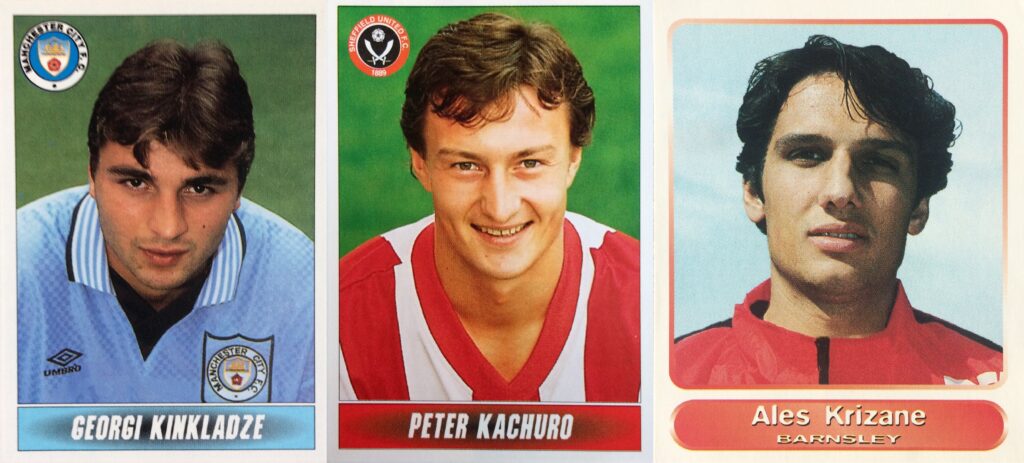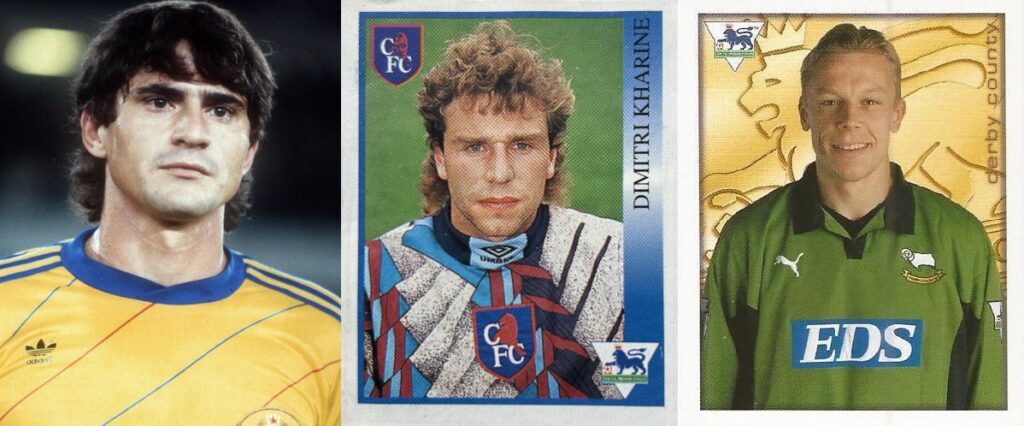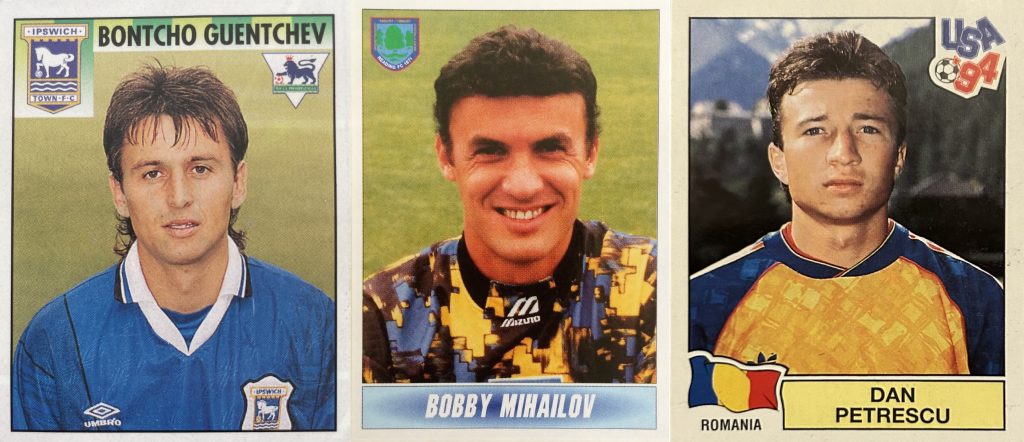Eastern Europe: Foreign Players in the Football League
The fall of the Berlin Wall and changing regimes behind the ‘Iron Curtain’ of eastern Europe in the late 1980s gave new opportunities to footballers who had previously not been allowed to leave.

Players from Poland and Yugoslavia had been the earlier exceptions, arriving in the Football League from the 1970s within strict age limits. Such changes were slower to come to the Soviet Union, where it was almost impossible for a top player to leave the country. The first is believed to be Anatoli Zinchenko – a former international already past 30, who joined Rapid Vienna in 1980. Only much later in the decade, by the time of Mikhail Gorbachev’s reforms, did Soviet players such as Oleg Blokhin, Rinat Dasaev and Aleksandr Zavarov move to western Europe – and one to England.
Sergei Baltacha arrived at Ipswich Town in December 1988, aged 30. It was an impressive signing, the defender having played for the USSR 45 times including a goal at the 1982 World Cup. Baltacha made his last national team appearance as substitute as the Soviets lost the 1988 European Championship Final. After a goalscoring debut at Portman Road, he was often played out of position in midfield for the Second Division club. Baltacha eventually left Ipswich for St. Johnstone in the summer of 1990 and later became player-manager at Inverness Caledonian (Thistle). His daughter Elena was the British no. 1 tennis player before her tragic early death at age 30. His son Sergei Jr qualified to play for Scotland’s under-21s, and his professional career included a brief stay at Millwall in 2003.

Above: Sergei Baltacha, Ipswich Town
Below: Sergei Gotsmanov, Brighton & Southampton

Manchester United’s search for a goalkeeper in the early days of Alex Feguson’s reign led them to consider signing Dasaev, then possibly the best in Europe. As it was, the next batch of Soviet players arrived on the south coast. Sergei Gotsmanov, who had scored at Wembley in 1984 and also featured in the USSR’s run to the 1988 Euro Final, joined Brighton in February 1990. Moving on to Southampton that summer, he teamed up with defender Alexei Cherednik, a £300,000 signing towards the end of the 1989-90 season. Striker Igor Gurinovich also enjoyed a spell at Brighton in 1990-91, only to be denied a work permit, and in the same season Victor Yanushevsky found himself in the even more unlikely surroundings of Fourth Division Aldershot. Gurinovich and Yanushevsky had both won their only caps for the Soviet Union in 1984.
The most successful of all the signings from the USSR was Andrei Kanchelskis, an unknown when joining Manchester United in March 1991 for £650,000. The winger established himself at Old Trafford, winning two Premier League titles before a record £5m move to Everton in 1995. Kanchelskis (born in the Ukrainian SSR and eligible for Lithuania) won his first caps for the Soviet Union, then represented the CIS, an association of transitional successor states, at Euro 92. After controversially missing the 1994 World Cup, Kanchelskis played for Russia at Euro 96. He was one of many players born in the USSR later to represent independent or newly formed states. Gotsmanov was the scorer of the first goal for the Belarus national team in October 1992, with Gurinovich also featuring later on.

Goalkeeper Dmitri Kharine was another to play internationally for the USSR, CIS (Euro 92) and Russia (World Cup 94 and Euro 96). He signed for Chelsea during the first Premier League season and remained with the club until 1999. In contrast, internationals Vasili Kulkov and Sergei Yuran lasted only a matter of months in London. The pair joined Millwall on loan from Russian champions Spartak Moscow at the start of 1996, with the club in the promotion picture only for their season to unravel and end in eventual relegation. Kulkov was soon injured while the out-of-shape Yuran was described by manager Jimmy Nicholl as “an absolute disgrace.”
The often-difficult process of adapting to English football, especially for players from the (former) Soviet Union, was eased by interpreters. The most prominent was George Scanlan, Head of Languages at Liverpool Polytechnic, who was asked to act as official translator for the USSR team which reached the 1966 World Cup semi-finals, and over the following decades accompanied British club and national team visits to eastern Europe and the Soviet Union. Scanlan was also key to transfer negotiations for players from Baltacha to Kanchelskis moving to the UK, where he would help them to acclimatise (and also influence Kanchelskis’ move to Everton).

The distinction of the first player from the Soviet states to play in England fell to Eduards ‘Eddie’ Freimanis, a Latvian international who found himself at then-non-league Peterborough in 1947-48, moving on to play league football for Northampton Town the following season. Half a century later a second Latvian, Marian Pahars, was signed by Southampton. With the collapse of the USSR, ‘new nations’ emerged (or re-emerged) as independent states in eastern Europe. Alongside Latvia, the Baltic countries consisted of Lithuania and Estonia – from where goalkeeper Mart Poom made a career in England, beginning at Portsmouth in 1994.
From Belarus, striker Peter Katchouro joined Sheffield United in 1996; a year earlier, Manchester City had signed Georgian midfielder Georgi Kinkladze, an enigmatic talent and a fans’ favourite during a difficult period for the Maine Road club. Kinkladze played alongside compatriot Mikhail Kavilashvili, while fellow Georgian Temuri Ketsbaia also made an impression on a smaller scale at Newcastle later in the decade. The first player in England from Slovenia was Aleš Križan at Barnsley in 1997; Moldova’s first representative, Ion (Ivan) Testemiţanu, arrived at Bristol City a year later. Independent from the Czech Republic, Slovakia provided Vladimir Kinder at Middlesbrough, a 1997 signing.

Ştefan Iovan – Dmitri Kharine – Mart Poom
The first attempt to bring Czech players to the Football League was Derby’s infamous bid for Ivo Knoflíček and Luboš Kubík in 1988-89. Controversial Czech-born chairman Robert Maxwell attempted to bring the pair to England for free after their defection, only to find the players’ club (Slavia Prague) and FIFA less than keen on the arrangement. Both players featured in Czechoslovakia’s international swansong when they reached the quarter-finals of the 1990 World Cup, with Kubik also appearing for the Czech Republic at Euro 96. Goalkeeper Luděk Mikloško had joined West Ham in early 1990 and was also in the World Cup squad, though second choice behind Jan Stejskal who moved to QPR after the tournament. Both keepers stayed into the Premier League era, and were joined by a third, Pavel Srníček, at Newcastle in 1991. Staying at the club until 1998, the late Srníček became their longest-serving foreign player at the time.
Jozef Vengloš was Czechoslovakia’s manager at the 1990 World Cup (as he had been at the 1982 tournament and Europa 80), and afterwards took over from Graham Taylor at Aston Villa to become the first foreign manager at the top level of the Football League. A highly regarded coach, Vengloš was only in charge for a single unsuccessful season at Villa Park. He later took over at Celtic in 1998, where his signings included Czech midfielder Lubomír Moravčík. After Vengloš’s departure, Villa took a chance on defender Ivo Staš who had played against them (scoring an own goal) for Banik Ostrava in the previous season’s UEFA Cup. Staš however failed to make a league appearance in the 1991-92 season. The next generation of Czech stars emerged at Euro 96, by then playing as the Czech Republic; after their appearance in the final, Karel Poborský (Manchester United), Patrik Berger and Vladimír Šmicer (both Liverpool) made their way to the Premier League.

Above: Ivo Knoflíček and Luboš Kubík; Pavel Srníček
Below: Jozef Vengloš – István Kozma – Sergei Baltacha

Hungary’s main impact on English football remains their historic and much-referenced 6-3 win at Wembley in 1953. Their lesser-known post-War contribution to the Football League came from Miklós ‘Mick’ Nagy, Bela Olah and János ‘Johnny’ Haasz – all three refugees from Soviet rule. Defender Nagy arrived after the Second World War and was on the books of league clubs Scunthorpe and Swindon in the early 1950s before settling at Southern League Yeovil. Olah and Haasz both came to England in the wake of Hungary’s 1956 uprising. Olah, a winger who played for Northampton Town either side of spells in non-league, said he chose England because it “was a world soccer force, second then only to Hungary.” Haasz was a highly rated inside-left initially banned by FIFA and only able to play League football from 1960 – making a single appearance for Swansea before moving to Workington and then Southern League Cambridge, where he is fondly remembered. In early 1992 Liverpool manager Graeme Souness made a surprise signing from Dunfermline, and István Kozma became the first Hungarian in decades to play in the Football League (and the first-ever to appear, briefly, in the Premier League) during his undistinguished stay at Anfield.
Romanian international full-back Ştefan Iovan was the captain of Steaua Bucharest as they lifted the European Cup in 1986 after a penalty shoot-out win over hot favourites Barcelona. The defender became the first Romanian in English football when he made a surprise move to Second Division Brighton early in 1991, appearing in that season’s play-off final before falling out of favour. The Romanian national team had grown in stature during the 1980s, and the side spearheaded by Gheorghe Hagi shone in reaching the quarter-finals of the 1994 World Cup. After the tournament, Ilie Dumitrescu, Gheorghe Popescu (both Spurs) and Dan Petrescu (Sheffield Wednesday) all moved to the Premier League. They were followed by strikers Florin Raducioiu (West Ham) and Viorel Moldovan (Coventry) before the end of the decade. Only Petrescu made a lasting impression, primarily during his five years at Chelsea before he also had spells with Bradford and Southampton.


Bulgaria went a stage further than neighbours Romania at USA 94, with a player already in England in their ranks. Boncho Genchev joined Ipswich during the first Premier League season, later moving to Luton. Goalkeeper Borislav ‘Bobby’ Mikhailov was a veteran of the Bulgarian 1986 World Cup team, appearing in two further tournaments as well as Euro 96 – by which time he was at Reading. He signed for a club record £800,000 but failed to reproduce his international form, leaving after two years better remembered for his ‘hair’ than his performances.

Sergei Baltacha, Ipswich Town 1988
Several images courtesy of Peter Lythe, Miles McClagan (Flickr and twitter @TheSkyStrikers), @RetroITFC & Shahan Petrossian (Soccer Nostalgia).
The arrival of foreign players to the Football League from eastern Europe and beyond is one of the topics discussed in my book Before the Premier League: A History of the Football League’s Last Decades.